Puckle Surname Ancestry ResultsOur indexes 1000-1999 include entries for the spelling 'puckle'. In the period you have requested, we have the following 146 records (displaying 121 to 130): Single Surname Subscription | | | Buying all 146 results of this search individually would cost £704.00. But you can have free access to all 146 records for a year, to view, to save and print, for £100. Save £604.00. More... |
These sample scans are from the original record. You will get scans of the full pages or articles where the surname you searched for has been found. Your web browser may prevent the sample windows from opening; in this case please change your browser settings to allow pop-up windows from this site. Boys entering Sherborne School
(1885)
The grammar school at Sherborne in Dorset, which doubtless existed from the creation of the diocese of Sherborne in 705, was refounded by king Edward VI in 1550. At the quatercentenary in 1950, a fourth edition of the Sherborne Register was published, listing boys entering the school during those four centuries. In truth, the materials for this register survive but fitfully before 1823; for some years, no names are known; sometimes all that is known is a surname. But from 1823 onwards the lists and the details get steadily more comprehensive. By the 20th century the boys are listed alphabetically by surname under term of entrance. Surname is given in bold, then christian names, name of father (surname and initials) and address; year of birth; house (a, School House; b, Abbey House; c, The Green; d, Harper House (formerly The Retreat); f, Abbeylands; g, Lyon House; h, Westcott House); whether represented the school at cricket (xi), football (xv), shooting (viii), &c.; year of leaving; summary of degrees, career &c.; and (in italics), address as of 1950. Names in the early lists marked with an asterisk are found inscribed on the oak panelling or on the stone walls of the former schoolroom. (F) in the lists indicates a foundationer, receiving free education: after 1827, when this privilege was restricted to boys from Sherborne and neighbourhood, nearly all foundationers were day-boys.PUCKLE. Cost: £4.00.  | Sample scan, click to enlarge
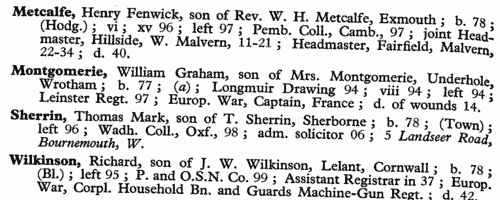
| Men-at-the-Bar
(1885)
Joseph Foster's Hand-List of Men-at-the-Bar gives a paragraph biography of men who had been called to the bar and were alive in 1885. After the full name (surname first, in capitals) there is a short statement of occupation or practice; a student at which inn of court; when called to the bar; father's name and then address; when born; if married, and, if so, wife's name (and her father's name) is often given. At the foot, in small type, is present residence, as of 1885.PUCKLE. Cost: £4.00.  | Sample scan, click to enlarge
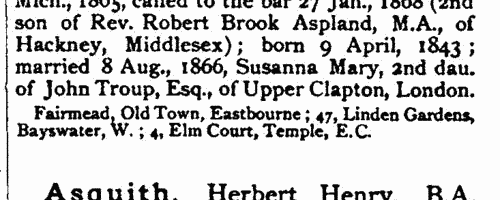
| Boys entering Wellington College in Berkshire
(1887)
Wellington College, near Wokingham, was originally founded for the education of sons of military officers. A register of boys entering the school from First Term 1859 to Michaelmas 1933 was compiled by F. G. Lawrence for the Old Wellingtonian Society. In each entry the boy's name is given in full, in bold, surname first; age at entry (usually 11 to 14); then, in brackets, the name of the dormitory or house to which he belonged, in italics, with the years of his stay; then his father's name (usually surname and initials, but not christian name) with military decorations where appropriate. School prefects and captains are noted as such; if the boy played cricket for the school, XI with the years; academic honours, scholarships, &c.; a brief biography; and date of death, or (where known) address in 1933. Year of marriage is given, and sometimes the wife's name and/or her father's name. Clearly, those boys who kept contact with the school and/or had distinguished military careers have detailed entries; others disappeared into oblivion on leaving.PUCKLE. Cost: £6.00.  | Sample scan, click to enlarge
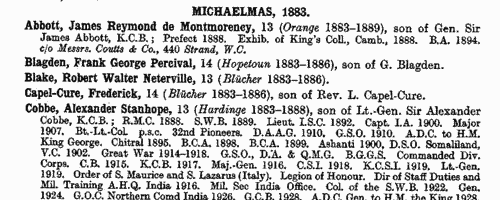
| Guarantors of the Anglican Church Congress
(1892)
The 32nd annual congress of the Anglican church was held at Folkestone on the 4th, 5th, 6th and 7th October 1892. Moral and social questions were discussed as well as the purely theological and ecclesiastical - The Relation between the Authority of the Bible and the Authority of the Church; the Attitude of the Church towards Labour Combinations; the Work of the Church of England on the Continent; the Result of the Neglect of Religious Instruction in Elementary Schools; Canon Law; the Duty of the Church to the Agricultural Population; Christian Ethics; Meeting of Women; the Temperance Movement; Physical Recreation; the Permanent Value of the Old Testament; Thrift and the Poor Law; Vivisection; Preparation for Clerical Orders, and of Laymen for Evangelism; Foreign Missions; the Duty of the Church towards Soldiers; Christian Doctrine and Christian Life; Preaching in the Church of England; and the Church's Work at the Seaside. The sermons, letters, addresses and discussions (of clergy and laity) were all published in this, the official report of the congress. The congress cost £1,822 14s 1d to hold; the receipts were £1,547 18s 5d, leaving a deficiency of £274 15s 8d, which was raised by call on the guarantors. The full list of the guarantors (who had each pledged from 10s to £200 beforehand) was printed in the official report, and this, together with the names of a handful of donors, is indexed here.PUCKLE. Cost: £6.00.  | Sample scan, click to enlarge

| Boys entering Tonbridge School
(1893)
W. O. Hughes-Hughes, late Assistant-Master of Tonbridge School, prepared this edition of the school register. The Kent grammar school was founded by royal charter in 1553, but the surviving register commences with the names of 69 boys called over on Skinners' Day 1826. After that they are arranged alphabetically by quarter to 1833, and thereafter by term of entry. Each entry gives, where known: the boy's surname (in capitals) and full christian name(s); the years when at the school; father's name; year of birth; school honours; and a resume of his subsequent career. The work was published in 1893, so the details of the boys entering in the last few years are correspondingly brief; the names of those still at school at the time of publication are indicated with an asterisk. The entries for 1893 itself only include boys entering in Lent Term.PUCKLE. Cost: £4.00.  | Sample scan, click to enlarge
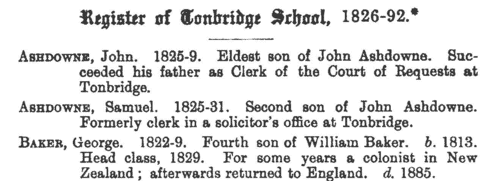
| Residents of Surrey
(1895)
Kelly's Directory of Surrey includes this alphabetical Court Directory, listing private residents in the county. In fact, this listing is a little more comprehensive than the main directory, in that it includes residents of some London suburbs that, although in the county of Surrey, are not included in the Surrey directory. Residents are listed surname first, then christian name or initials, and postal address.PUCKLE. Cost: £4.00.  | Sample scan, click to enlarge

| Boys entering Uppingham School
(1902)
The public school at Uppingham in Rutland was founded by Archdeacon Johnson in 1584. A roll of scholars from 1824 to 1905 was edited by J. P. Graham, and published in 1906. This was a revision and updating of an 1894 edition of the roll, the great bulk of the work having been done by Mrs Mullins. The roll is arranged by year, and within each year by term of entrance, and then alphabetically by surname within each term. Each boy's name is given, surname first, with an asterisk where known (in 1906) to have died. Then there is month and year of birth, father's name (most often just surname and initials) and address (at entrance). Where the boy represented the school at Rugby football (XV) or cricket (XI), that is indicated. After the month and year of leaving the school, there is a brief summary of achievements in later life, and, where known, address as in 1906; but as late as this year, most boys were still at school and the entries are brief. From 1875 onwards the house within the school is also noted, with these abbreviations: A., Mr Constable's House; B., Brooklands; C., West Bank; E., Mr J. Gale Thring's House; F., Fircroft; Fgh., Farleigh; H., Highfield; L., The Lodge; L. H., Lorne House; M., Meadhurst; N., The Hall; R., Redgate; R. H., Red House; S., School House; and W. D., West Deyne.PUCKLE. Cost: £4.00.  | Sample scan, click to enlarge
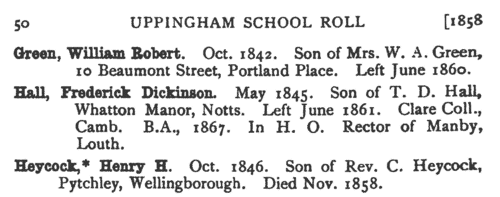
| Indian Civil Servants
(1904)
The India List and India Office List was compiled from official records by direction of the Secretary of State for India in Council, and published by the India Office annually. The volume for 1905 includes this Record of Services, corrected to 1 July 1904. It includes Officers of the Home Establishment of the Secretary of State, Officers of the Covenanted Civil Service, and those appointed under the Native Civil Service Rules, other Officers in Civil Employment in India whose substantive pay was at least 1000 rupees a month, and, with a few exceptions, all officers of those classes who had retired since 1886.PUCKLE. Cost: £4.00.  | Sample scan, click to enlarge

| Madras Civil Servants
(1905)
The India List and India Office List was compiled from official records by direction of the Secretary of State for India in Council, and published by the India Office annually. It covers civil servants and military except for officers drawing substantive pay of less than 500 rupees a month. Names shown in italics are those of officers in foreign service, supernumerary, seconded or employed outside their own departments. The Gradation List of Indian Civil Servants on the Madras Establishment arranges them chronologically by seniority (from 1865) and gives full names, honours, and an abbreviated note of each man's current substantive appointment.PUCKLE. Cost: £4.00.  | Sample scan, click to enlarge

| Order of the Indian Empire
(1905)
The India List and India Office List was compiled from official records by direction of the Secretary of State for India in Council, and published by the India Office annually. The 1905 edition includes this list of those awarded the Most Eminent Order of the Indian Empire, instituted in 1878 - Knights Grand Commanders (G. C. I. E.), Knights Commanders (K. C. I. E.), and Companions (C. I. E.), with dates of their appointments.PUCKLE. Cost: £4.00.  | Sample scan, click to enlarge

|
Research your ancestry, family history, genealogy and one-name study by direct access to original records and archives indexed by surname.
|












